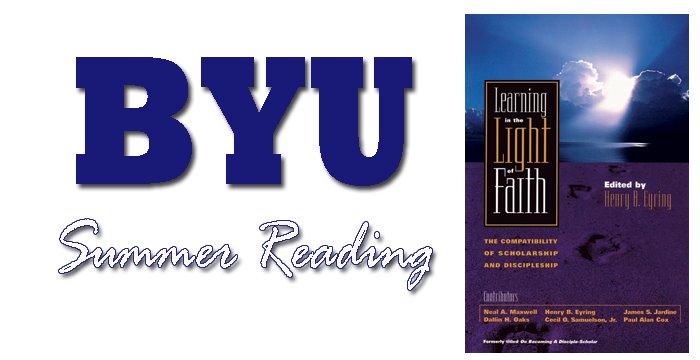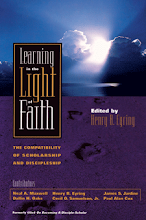Elder Maxwell tells us it is “no wonder [that] a true community of scholars would qualify to be part of a larger community of Saints” (p. 6). What important qualities do saints and scholars share? How will you cultivate these qualities and begin to become a disciple-scholar during your first year at BYU?
Welcome!
Welcome to the BYU Summer Reading program blog. We are looking forward to hearing what you have to say about Learning in the Light of Faith. Check back here often for information about the summer reading, discussion questions, and exciting contests.
Wednesday, July 1, 2009
First Summer Reading discussion question
We will be posting discussion questions throughout the rest of the summer for you to respond to. Feel free to comment on each question, and also on others' responses. This first question is in reference to the first essay in the book- The Disciple Scholar, by Elder Neal A. Maxwell.
Elder Maxwell tells us it is “no wonder [that] a true community of scholars would qualify to be part of a larger community of Saints” (p. 6). What important qualities do saints and scholars share? How will you cultivate these qualities and begin to become a disciple-scholar during your first year at BYU?
Elder Maxwell tells us it is “no wonder [that] a true community of scholars would qualify to be part of a larger community of Saints” (p. 6). What important qualities do saints and scholars share? How will you cultivate these qualities and begin to become a disciple-scholar during your first year at BYU?
Subscribe to:
Post Comments (Atom)

.gif)


Elder Maxwell explains that the "primary attribute of the disciple-scholar" is meekness. It is also important to remember that intelligence or status with regards to one's education, should not keep us from being humble, teachable, and understanding. We can all learn from one another! Another thing that is a good quality of a disciple-scholar is to give service. If we are always seeking for a way to help one another, meekness and humility will be easier to attain. I want to work to continue to strengthen my testimony of the gospel by striving to better myself. It is comforting to know that I don't have to choose between scholarship and discipleship.
ReplyDeleteBoth scholars and disciples need to learn the importance of work: "Work is the law of life; it is the ruling principle in the lives of the Saints" (Bruce R. McConkie). As Saints, we need work in order to grow spiritually, and as students, we need to study and manage our time with schooling and the other activities of college life in order to succeed. This upcoming school year, I will try my best to manage my time wisely between my studies, my church assignments, and the ladies. Hard work in all these categories will help me succeed... hopefully in the last category as well.
ReplyDeleteOkay, so I think that the two main attributes of scholars and disciples alike are those of humility and the love of learning. Scholars need to love to learn, and still be humble enough to know there is always room for improvement. Disciples love to learn of Christ, and are humble enough to follow the sprit and his teachings. Putting these together to make a disciple-scholar makes for
ReplyDeletea person that loves to learn of everything scholars learn about– such as philosophy, science, math, and all of that jazz; and everything that disciples learn about– like principals of the gospel, Christ and his teachings, and other things like that. Disciple-scholars are also humble enough to
realize that there is always more to learn, and follow the prompting of the Holy Ghost. They also have and understanding of personal revelation which makes it easier for them to learn everything. I’m going to try really hard to incorporate these disciple/scholar like attributes to my studies, and every other part of my life.
I couldn't agree more that meekness/humility is the most important attribute of both the disciple and the scholar! All sin derives from pride: the assumption that one doesn't need to submit to God. Therefore, having the humility to recognize God's authority is the key to living the gospel, i.e. discipleship. Similarly, great scholars need to be meek enough to realize that there is always something that they can learn from someone else, even someone they hold in low esteem. We all need help from others to overcome our own biases and preconceptions! Of course, a scholar must also exercise hard work and/or genius, but discipleship is much easier: all it takes is humility.
ReplyDeleteMeekness is absolutely essential to being a disciple-scholar, and I second what has already been said about it. I really feel that it is important for us to recognize that, compared to God, we know so little. There is always more to learn about the gospel and about the world around us. I've often heard humility defined as being teachable, and I think that is highly significant - when we are humble, we realize that God knows so much more than we do and we are willing to trust Him and learn from Him. Pride, on the other hand, claims to already know enough and have no further need to learn. In order to become disciple-scholars and learn all we can, we must be meek and teachable.
ReplyDeleteI agree with all the above comments that humility and meekness are important qualities of scholars/disciples. I would like to add to this that an important quality for both spiritual and academmic pursuits is the simple desire to learn and become a better person so that we can bless the lives of those around us. Gaining secular knowlege helps us to better understand the world and our role in it. A disciple-scholar "understands what kind of community he or she should help to build." Another important quality of both disciples and scholars is dedication, or consecration. Elder Maxwell brings up the story of the young rich man who could not give up his earthly treasures to follow Christ. He was not fully dedicated and therefore missed out on all he could have learned and become by following Christ. He probably felt the sacrifice was too great but "the greater the submission, the greater the expansion." I hope that in my 1st year at BYU I will be able to grow as a disciple-scholar. I know I have the desire to learn, but the challenge will be to dedicate myself to it when there will be so much else to distract me.
ReplyDeleteI would have to agree that meekness is a very important attribute, regardless of whether someone is a leader or a follower. I liked how Elder Maxwell brought out the point that Moses was meek enough to learn from the advise of Jethro. I also liked the quote "To learn by example is to submit to authority". Throughout college, I am going to strive to be meek and teachable like Moses. I am also going to watch my leaders like Brigham Young watched Joseph Smith, submitting to their examples and patterning my life after them. Through these efforts, I will be more open and ready to learn of the doctrine as well as secular knowledge.
ReplyDeleteAfter reading Elder Maxwell’s essay The Disciple Scholar, it is evident to me that although a disciple-scholar should seek both secular and religious truths, he or she should always have a pure, humble spirit. As a result, I definitely agree with all the comments that point out meekness as a crucial element of the disciple-scholar. Without submitting before God, one is subject to pride and cannot learn eternal truths. As others have cited, we can learn an important lesson from the story that Elder Maxwell discusses of the rich, intelligent businessman who “lacked consecration”. It is heartbreaking to know that if the man had only followed God with a meek, open spirit, he could have served God in the way he was meant to do. On the other side of the spectrum, Elder Maxwell brings up Oliver Cowdery, who although tried to help bring about the Restoration in numerous ways, failed to translate a task for the Lord because he “lacked intellectual diligence, thinking all he had to do was ask.” Without actively seeking knowledge, one is not following what the Lord instructs in Doctrine and Covenants, namely to learn about “things both in heaven and in earth”. Therefore, I wholeheartedly agree with Elder Maxwell’s concept of consecrated scholarship, which entails bringing a pure, submissive attitude toward all types of learning and remembering that we are serving the Lord. At BYU, I will strive to be meek and keep the Lord foremost in my mind, whether I am in the classroom or at a devotional or at sacrament services. By having this attitude, I hope to be a disciple-scholar which will enable me to find and use my gifts to best serve the Lord.
ReplyDeleteIn addition to all these fantastic attributes, I think a mere enthusiasm of spirit is equally necessary. A true scholar constantly seeks enlightenment and elevation, and what better way to be "enlightened" than by the Light of the World himself -- Jesus Christ. Disciples seek with all their heart, might, mind and strength better ways to elevate themselves -- to learn how to better follow and serve and love Jesus. The Doctrine and Covenants puts it this way: "Verily I say, men should be anxiously engaged in a good cause, and do many things of their own free will, and bring to pass much righteousness." I hope to always be "anxiously engaged" in the best cause -- that of Christ himself.
ReplyDelete